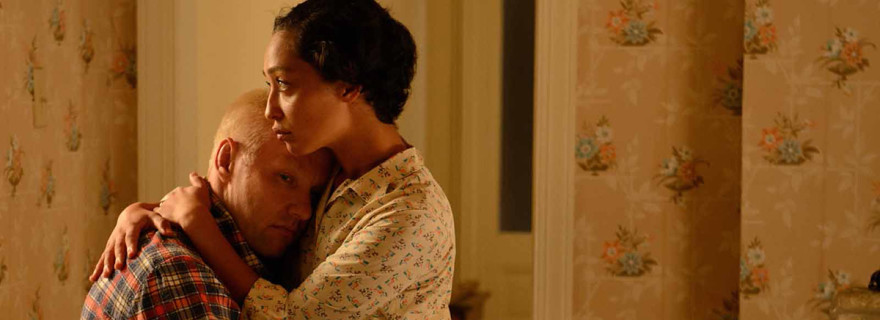'Loving'
Movie Rating:
3.5
‘Loving’ is one of those true life inspirational stories that tend to come out around Oscar season and coast by on message rather than content. Thankfully, this is one of the few examples that lives up to its origin and has quietly become one of the more important films of the year. A big reason why is the involvement of writer/director Jeff Nichols (‘Take Shelter’, ‘Midnight Special’), a filmmaker with a distinct voice who doesn’t fall into easy traps of melodrama or sentimentality.
Another reason is more accidental and unexpected. This story of love conquering the hate of racial division was always relevant, but now that it will play on screens in Trump’s America, it feels all the more vital and important than before.
The film is about Richard and Mildred Loving (Joel Edgerton and Ruth Negga), an interracial couple in 1950s Virginia. Clearly, that wasn’t a great time for this sort of relationship. Nonetheless, they found love. When Mildred became pregnant, Richard didn’t hesitate in asking her to marry him. Their wedding was illegal in their county, so they crossed state lines to make it happen. They intended to live alone in an isolated country home where no one could bother them, but the racist locals found them anyway. Police broke into their home in the middle of the night, locked them up, and promised permanent imprisonment if they dared to remain a couple. As a result, they moved to Chicago to start a family, moving back only in secret and in great isolation years later when there weren’t so many prying eyeballs. Around the same time, a young lawyer (Nick Kroll, really) learned of the Lovings’ story and decided to take their case all the way to the Supreme Court in an attempt to revise national law on interracial marriage. Given that this movie even exists, you can likely assume where things go from there.
Nichols slowly lets his story unfold over several years with a delicate sense of social observation. He never glamorizes or exaggerates, and barely engages in the rousing dramatics one might expect. Instead, he presents his central couple with a tone that can only be described as loving. They merely are, and their approach to a world changing around them is to simply wait. The discrimination they face is never overstated and the racists are never cartoonish. The story plays out in cold reality, with Nichols’ camera a half step back at all times to observe rather than force any sort of audience allegiance. It’s certainly not the most dramatically exciting approach, but it is the most honest. Under the circumstances, it’s also the most moving. There’s no need to hammer on about the right and wrong of this situation. It’s obvious. Seeing love head-butting against hate covers it.
Nichols is a filmmaker with a distinct visual style both beautiful and understated. Every image is carefully framed, but the camera stays back at just enough distance for the actors to roam freely like people bumbling through the world. That freedom allows the performers to shine brightly. Joel Edgerton is extraordinarily quiet and contained, playing a man whose business is his own and who is deeply uncomfortable with the fame and importance that he finds himself unwittingly thrust into. His character is passive, yet the actor remains clearly controlled throughout. We know what he’s thinking, even though he’d never dare say it. Ruth Negga is just as strong, equally quiet but not quite as withdrawn. She provides a subdued warmth that explains all about their relationship with few words. The rest of the supporting cast are almost as good as the leads, particularly Nick Kroll, who proves to be just as charismatic a screen presence without a comedy crutch. Nichols’ regular Michael Shannon has a small role as a humble man without any of his usual imposing eccentricities.
As a tale of accidental revolutionaries quietly accepting their importance, ‘Loving’ is a beautiful real life fable. Unfortunately, at a certain point, the narrative turns the movie into a courtroom drama with all the overly-grand speechifying that suggests. Nichols remains in command visually, but loses some of the naturalism while pounding his points home. The climax is disappointing, but it’s not a movie killer. That’s how the story went, after all, but the generic quality of the courtroom drama sucks some authenticity away.
Thankfully, ‘Loving’ remains an extraordinary drama that finds great warmth and emotion in the smallest of places. It’s a gentle hug of acceptance and a subtle political rallying cry for the same. It’s exactly the sort of thing the world needs right now when such things suddenly seem to be going out of fashion.



